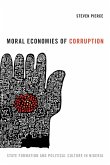This book seeks to explain the events that have been taking place in Côte d'Ivoire since 1999 and which are commonly referred to as 'la crise ivoirienne' (the Ivorian crisis). It seems that the day to day interpretation of the events did not provide a satisfactory explanation of the deep fracture and that it was necessary to reconsider the essentialist theoretical categories that are striving to impose on us a false view, made cumbersome by ethnocentric prejudices. To avoid falling into the trap of the day to day interpretation of events will require an in-depth questioning of the causes of the foreseen collapse of the Ivorian model. Having a grasp on the historical meaning of facts is required in examining the sequence and interconnection of events which we always need to rule on the historical weight in order to gauge the tragic trend of the social dynamics. While looking for the causes of the social and political rift, the authors of this volume started by asking a central question: How does the weight of the modern Ivorian society formation intervene in the modalities of the actions of individuals and current collectivities? The brutal and violent fracture which the Ivorian social formation underwent brings forth, once again, the issue of collective identities and unveils, at the same time, the challenges related to the incomplete nature of the construction of 'Nation States' in Africa. In fact, it is a mistake to think that the crisis spontaneously started among partisan higher authorities and to ignore that behind the ostentatious declarations on National Unity, pre-colonial groups have not completely melted into the modern 'Nation'. Furthermore, in the process of 'national' social space formation, new social combinations emerge by continuously re-inventing themselves. It seems that the roots of current crises reside in the unprecedented transformation which contemporary African societies have been undergoing.








